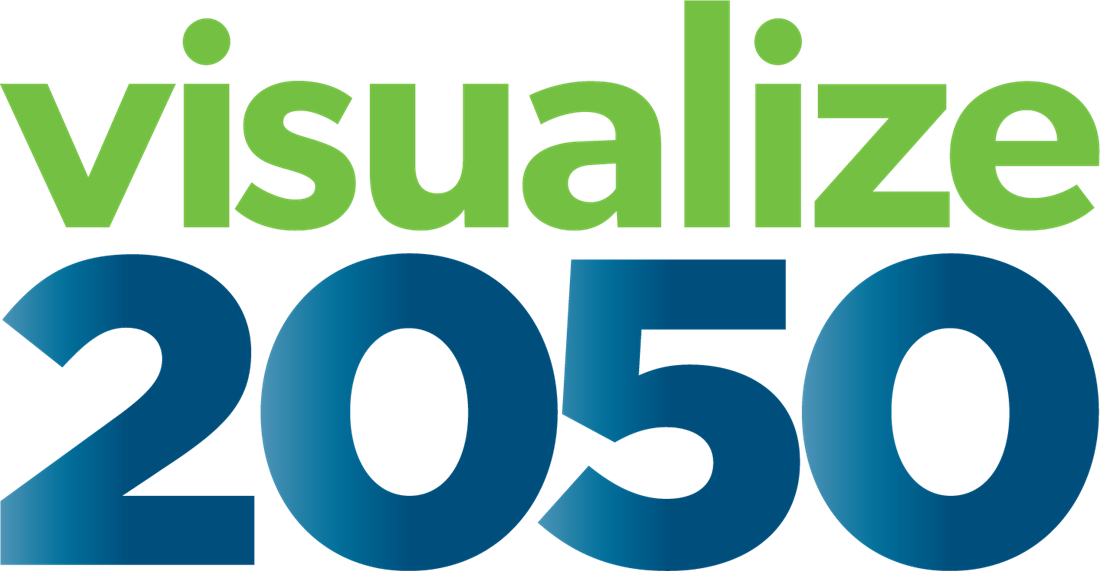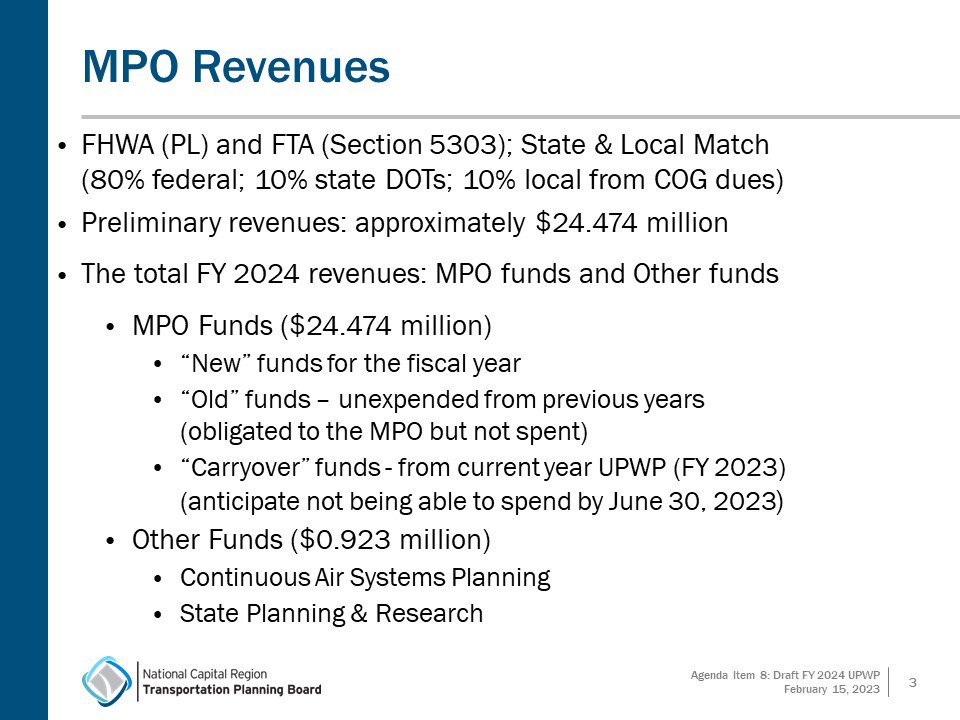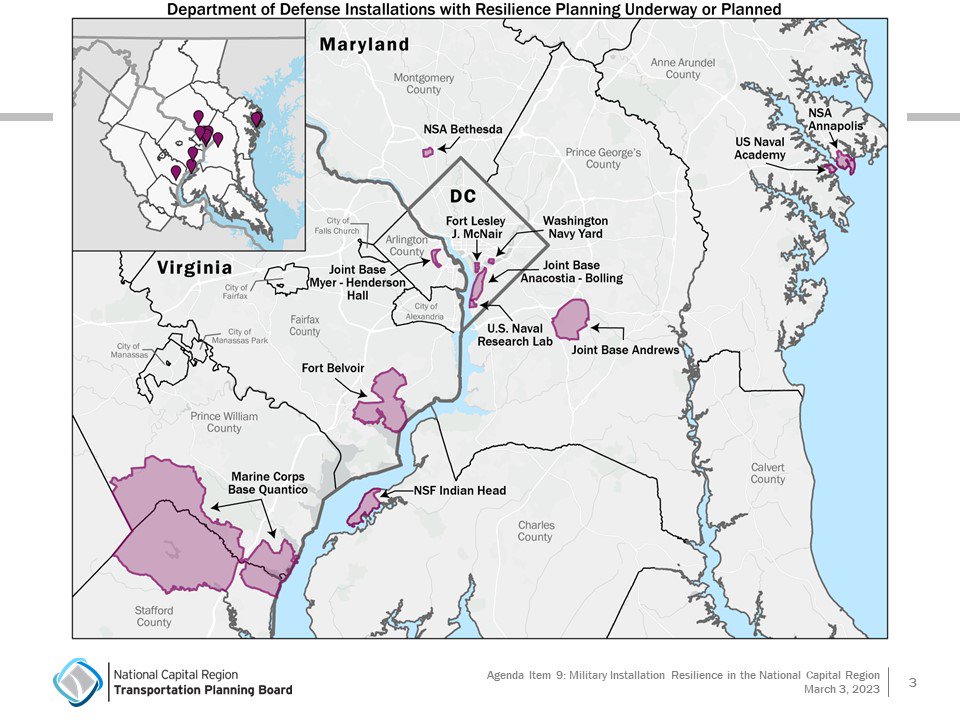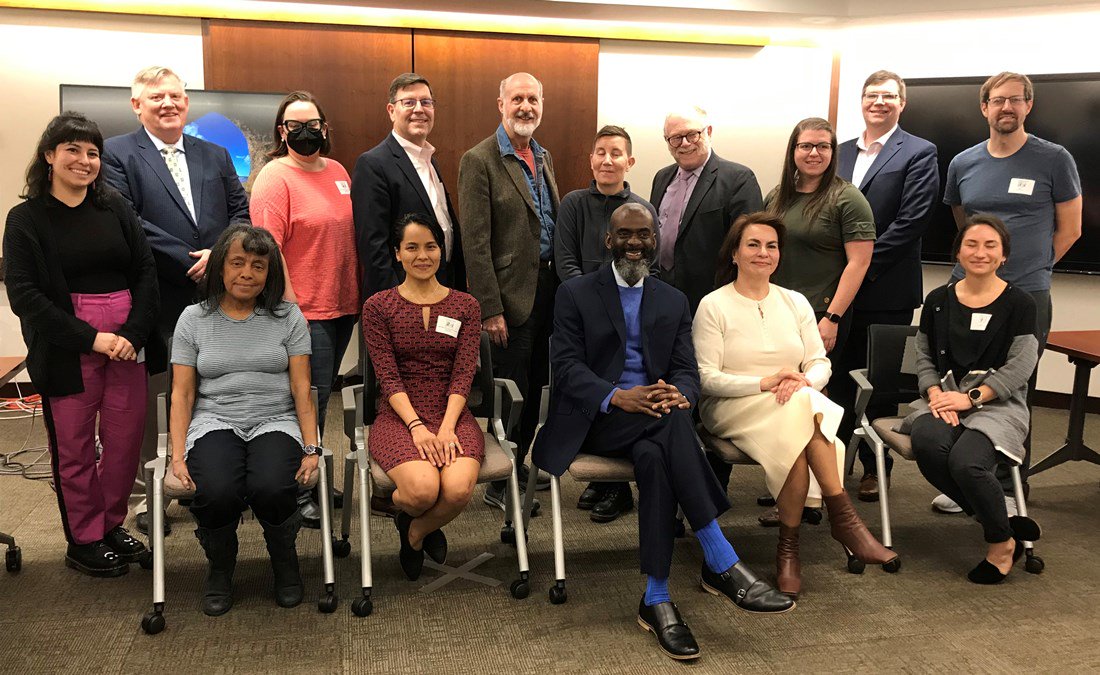On February 15, the TPB approved the TPB's Technical Inputs Solicitation document to kick off Visualize 2050, the long-range transportation plan update to Visualize 2045. In addition, the board received briefings on the draft Fiscal Year (FY) 2024 Unified Planning Work Program (UPWP), the draft FY 2024 Commuter Connections program, and a presentation on the U.S. Department of Defense Office of Local Defense Community Cooperation (OLDCC) Military Installation Resilience Review Program.
Meeting agenda, materials, and recording
CHAIRMAN’S REMARKS
TPB Chair Reuben Collins II commented on development of the long-range transportation plan and noted that the plan has a transparent process that listens to concerns to the member agencies, provides an opportunity to further discuss what the plan looks like, and opportunity for members to participate in what they would like the plan to be. All agencies will be asked to reexamine every project and resubmit projects that will better advance the region’s goals of improving mobility, increasing transit ridership, advancing equity, and addressing climate change. Chair Collins stated, “With today’s action, the process of updating the plan will begin.”
ACTION ITEM

Visualize 2050: Technical Inputs Solicitation Approval
The TPB Board unanimously approved the TPB’s draft Technical Inputs Solicitation (TIS) document that kickstarts the long-range plan update process. With the approval of the TIS, TPB staff will provide a list of current plan projects, programs, and policies to TPB member agencies for their re-examination and resubmission for the Visualize 2050 plan after the agencies evaluate whether projects are consistent with the TPB’s regional planning priorities. More details about the Visualize 2050 process and the Technical Inputs Solicitation is available in the TPB News feature “TPB kicks off Visualize 2050 long-range transportation plan update with Technical Inputs Solicitation process.”
The TPB’s complete Q and A discussion of the Technical Inputs Solicitation begins at the 51:30 mark of the posted YouTube recording of the February 15 meeting.
The Visualize 2050 plan process begins with the following steps:
February 15, 2023 – The TPB published a list of exempt (funded) and non-exempt (current project list reorganized) projects. Public comment on the projects will be forwarded to the agencies submitting projects.
March 2023 – TPB staff will schedule listening sessions with TPB board members and technical agency staff to discuss potential inputs. A project feedback form is available for those who would like to provide input on individual projects. Provide feedback.
June 30, 2023 – Preliminary inputs are due to TPB staff for the Visualize 2050 long-range transportation plan and the Air Quality Conformity analysis.
INFORMATION ITEMS
FY 2024 Unified Planning Work Program
Lyn Erickson, TPB Plan Development and Coordination Program Director, provided an overview of the proposed budget (slide below) for the FY 2024 Unified Planning Work Program (UPWP), which directs the scope of work for the TPB each fiscal year. The TPB will be asked to approve the UPWP at its March 15 meeting.
In addition to the TPB’s core activities outlined in the January 2023 TPB meeting recap, new or enhanced activities for FY 2024 include but are not limited to:
- Transportation resiliency planning
- Climate change mitigation assistance and coordination for implementing agencies
- New Regional Travel Survey (RTS) format, transitioning from a “once-a-decade” to a more frequent survey activity
- New surveys and data collection: regional coordination of future transit on-board surveys (TOBS), traffic technologies inventory, regional bike/active transportation count program, and intercity bus and rail survey
- FTA Section 5310 public transportation planning and project selection
- Map updates: National Capital Trail Network map, Regional Activity Centers map
- Emerging topics: curbside management, connected/automated vehicles, and micromobility

(TPB)
Draft FY 2024 Commuter Connections Work Program
Nicholas Ramfos, Director of Transportation Operations Programs, presented an overview of the FY 2024 Commuter Connections Work Program, which the TPB board will be asked to approve at its March 15 meeting for the new program year that begins July 1. Commuter Connections is an integral part of the TPB’s congestion management process for the region and supports the TPB’s greenhouse gas emissions reduction goals.
According to 2015 – 2019 American Community Survey data, 9.3 percent of commuters in the metropolitan Washington region carpooled and 13.4 percent used transit during the survey period prior to the COVID-19 pandemic.
Impacts of the program in FY 2020 include:
- Reduction of 137,000 vehicle trips
- Reduction of 2,6 million vehicle miles of travel
- Decrease in Nitrogen Oxides (NOx) by 0.5 Tons
- Decrease in Volatile Organic Compounds (VOC) by 0.4 Tons
This coming year’s budget of a little over $7.1 million features several new initiatives:
- An upgrade in the Commuter Operations Center database platform
- 50th Anniversary Commuter Connections marketing
- Post-pandemic marketing of alternative routes
- Publication and distribution of the 2022 State of the Commute Survey General Public Report publication and distribution
- Publication and distribution of the 2021 – 2023 Draft Transportation Demand Management Analysis Report
- Employer Outreach Customer Satisfaction Survey
U.S. Department of Defense OLDCC Military Installation Resilience Program in the Region
Jeffrey King, COG Director of Climate, Energy and Air Programs, gave an update on military community resiliency planning in the region. Funded and coordinated through the U.S. Department of Defense (DoD) Office of Local Defense Community Cooperation (OLDCC), Military Installation Resilience Reviews (MIRR) focus on DoD investments “outside the base fence line” that improve the resilience of the communities around military bases while supporting the missions of a base. Priority sectors for resiliency assessments and preparation are energy, telecommunications, transportation and transit, water, and wastewater.
COG has had a role in recent projects for Joint Base Anacostia Bolling, Washington Navy Yard, the Naval Research Lab, and Fort McNair. Additional assessment and measure recommendation projects have centered around the facilities in the map below.

(COG)
Engagement occurred between COG, federal partners, and key regional stakeholders including WMATA and utilities providers. Top priority resilience measures include retrofitting stormwater pumping stations, assessing, and addressing key telecommunications systems, supporting floodwall construction, and ensuring that Lower Anacostia Waterfront redevelopment is resilient. Other measures on which COG is partnering with DoD offices are increasing shade cover and green infrastructure and investing in affordable housing.
Transportation-specific measures for military installations in the region include:
- Constructing community electric vehicle charging stations
- Expanding connectivity to/from High-Capacity Transit Station Areas
- Implementing congestion relief and traffic control measures
In addition to these, an honorable mention measure is exploring opportunities for Potomac River ferry stops near installations.
Next steps for MIRR planning in the region include applying for a follow-on FY 2023 planning grant from OLDCC and seeking community input on priorities. Future planning will examine high-capacity transit connections and connecting a new trail on Joint Base Anacostia-Bolling and the Naval Research Lab to the District of Columbia’s South Capitol Street Trail.
Committee and Director’s Report Highlights
TPB Technical Committee, TPB Community Advisory Committee, Steering Committee, and Director’s reports are available on the February TPB meeting page.
Community Advisory Committee Highlight
The TPB welcomed new 2023 CAC Committee Chair Richard Wallace of Charles County, Maryland. The February CAC meeting focused on orientation for new members and an opportunity to hear about the TPB’s vision from TPB Chair Reuben Collins II. Comments and questions from members centered on infrastructure project timelines, the use of TPB’s project data by transportation agencies across the region, TPB’s role in transportation for older adults, and bicycle and pedestrian connections in the region.

(TPB: CAC Committee members attend the February 2023 meeting)
Director’s Report Highlight
TPB Staff Director Kanti Srikanth announced three Transportation Improvement Program (TIP) amendments, informed the board that the TPB has written six letters of support for RAISE grant applications of TPB member agencies, and also shared the news that the Environmental Protection Agency (EPA) has certified that the region’s air quality meets the current 2015 National Ambient Air Quality Standard (NAAQS or Standard) for ozone.
Other positive news for the region includes the announcement that the U.S. DOT has awarded an inaugural round of funding for the Safe Streets and Roads for All program. Area jurisdictions receiving funding for SSRA action plans include:
- City of Frederick: Frederick Vision Zero: Comprehensive Safety Action Plan ($200,000)
- Frederick County Strengthening the Foundation for Safe Streets for All ($764,000)
- City of Alexandria High-Crash Intersection Audit and Design ($800,000)
- Loudoun County Safe Streets and Roads for All Action Plan ($464,000)
- Prince William County Comprehensive Safety Action Plan ($992,000)
NEXT MEETING
The next TPB meeting is scheduled for March 15 at 12:00 P.M. A YouTube livestream option is available for all TPB board meetings.